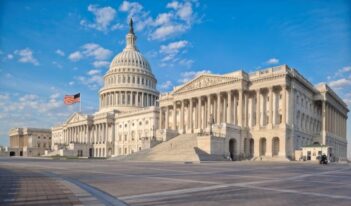
EPA proposes eliminating greenhouse gas regulation, judges issue further nationwide injunctions on birthright citizenship, and more…
IN THE NEWS
- The U.S. Environmental Protection Agency (EPA) proposed to rescind its 2009 “endangerment” finding that certain greenhouse gases–such as methane and carbon dioxide–can be regulated under the Clean Air Act. As EPA explained, the endangerment “finding is a prerequisite for regulating emissions from new motor vehicles and new motor vehicle engines.” If it is “finalized, the proposal would repeal all resulting greenhouse gas emissions regulations for motor vehicles and engines.“ In the 2009 finding, EPA determined that greenhouse gases threatened public health. That determination provided the basis for regulating gas emissions across numerous industries. In proposing to rescind the finding, EPA has claimed that it lacks statutory authority to regulate greenhouse gases. EPA has given the public until September 15 to file comments on the proposal.
- U.S. District Judge Leo Sorokin issued a renewed nationwide injunction blocking President Donald J. Trump’s executive order ending birthright citizenship, becoming the third judge to do so after the U.S. Supreme Court limited nationwide injunctions in June. In its June decision, the Court held that lower courts cannot issue universal injunctions when broader than necessary to protect the specific plaintiffs. Judge Sorokin held that anything less than a nationwide injunction would inadequately protect the plaintiff, the state of New Jersey, in part because additional U.S.-born children of migrants will enter the state while the case proceeds, creating a “patchwork” of citizenship and complicating state functions such as issuing Social Security numbers.
- A federal judge issued a nationwide injunction blocking the enforcement of a provision of President Trump’s mega tax and spending law that banned state Medicaid payments to select healthcare nonprofits for one year. The provision applies to providers offering abortions and receiving more than $800,000 in Medicaid reimbursements in 2023. Judge Indira Talwani of the U.S. District Court for the District of Massachusetts wrote that the law unfairly targeted Planned Parenthood providers for punitive treatment. Judge Talwani noted that the disruption in Medicaid funding would lead patients to suffer adverse health consequences. This decision follows a preliminary injunction from Judge Talwani last week, which restored funding to a narrower set of Planned Parenthood affiliates that did not exceed the Medicaid reimbursement threshold.
- President Trump and European Commission President Ursula von der Leyen announced a trade deal imposing a 15 percent baseline tariff on most EU exports to the U.S., while granting duty-free access for U.S. exports to the EU. The EU committed to $750 billion in U.S. energy purchases and $600 billion in investments. The U.S. and EU agreed to impose a 15 percent ceiling on EU exports subject to reciprocal tariffs on autos, pharmaceuticals, and semiconductors, while maintaining a 50 percent tariff on steel, aluminum, and copper. Negotiations continue on food and alcohol. The agreement drew criticism from French Minister Delegate for Foreign Trade Laurent Saint-Martin, who said the EU should have retaliated more forcefully.
- President Trump imposed a 50 percent tariff on most Brazilian imports, citing the prosecution of Brazilian ex-president Jair Bolsonaro as a key motivation. The tariff order would apply a 40 percent tariff on top of the 10 percent already levied, while sparing major sectors like aircraft, energy, and metals. Brazilian President Lula da Silva warned against a “lose-lose” trade relationship in response to the tariffs. President Lula da Silva emphasized Brazil’s willingness to negotiate but refused to link Bolsonaro’s legal troubles to economic talks, stating that Brazil would “negotiate as a sovereign country.”
- President Trump announced a 90-day tariff negotiation period with Mexican President Claudia Sheinbaum while keeping 25 percent tariffs in place on most Mexican imports, including cars, and 50 percent tariffs on metals such as copper and steel. Although some goods remain protected under the United States-Mexico-Canada Agreement, President Trump signaled dissatisfaction with the deal ahead of its 2026 renegotiation. President Trump tied the tariffs to fentanyl trafficking and the growing U.S.–Mexico trade deficit, which reached $171.5 billion last year. President Trump also claimed that Mexico would eliminate “non-tariff trade barriers” but gave no details.
- The U.S. Senate confirmed Susan Monarez as director of the Centers for Disease Control and Prevention (CDC), making her the first CDC director confirmed under the CDC Leadership Accountability Act of 2023, which added a Senate confirmation requirement for the position. Monarez, who served as the acting CDC director from January until March, received the nomination after President Trump withdrew the nomination of Dave Weldon, reportedly due to concerns that Weldon–who has asserted links between vaccines and autism–would not receive Senate confirmation.
- The Federal Trade Commission (FTC) launched a public inquiry into whether consumers “may have been exposed to false or unsupported claims about ‘gender-affirming care,’” particularly concerning minors. The inquiry, which gives consumers 60 days to comment, followed an FTC workshop earlier this month in which FTC officials suggested that practitioners of gender-affirming care may be “actively deceiving consumers.” The workshop included testimony from doctors, advocates, and “de-transitioners,” though not from supporters of such care. The inquiry aligns with recent executive efforts targeting gender-affirming care, including a January executive order terminating grants for institutions that provide what the order termed “chemical and surgical mutilation of children” and recent U.S. Department of Justice subpoenas of 20 doctors and clinics providing transgender medical procedures.
WHAT WE’RE READING THIS WEEK
- In an article in the Antitrust Law Journal, Ian Ayres, the Oscar M. Ruebhausen Professor of Law at Yale Law School, C. Scott Hemphill, the Moses H. Grossman Professor of Law at New York University School of Law, and Abraham L. Wickelgren, the Fred and Emily Marshall Wulff Centennial Chair in Law Professor at the University of Texas at Austin School of Law, proposed the use of negative ownership as a solution to the problem of companies engaging in collusive, anticompetitive behavior after mergers. Ayres, Hemphill, and Wickelgren described their concept of negative ownership as a way to connect a merged firm’s compensation structure to the performance of its rivals. They noted that the simplest way to accomplish this is by a merged firm shorting the stock of its competitors. With short stock positions, they explained, the value of a merged firm would decrease as the value of competitors increased. Ayres, Hemphill, and Wickelgren argued that requiring this type of negative ownership would reduce a merged firm’s incentives to engage in anticompetitive conduct such as raising prices for its goods.
- In an article in the Yale Journal on Regulation, Timothy Meyer, the Richard Allen/Cravath Distinguished Professor in International Business Law at Duke University School of Law, and Ganesh Sitaraman, the New York Alumni Chancellor’s Chair in Law at Vanderbilt University Law School, argued that U.S. presidents are increasingly bypassing both Congress and regulatory agencies to impose directly sweeping economic rules in a phenomenon they call “presidential regulation.” They argued that this trend has allowed Presidents to reshape domestic policy unilaterally due to broad delegations of power, reliance on national security justifications, and limited judicial oversight. Meyer and Sitaraman warned that this shift, accelerated by political gridlock and the decline of traditional administrative law, threatens transparency, accountability, and long-term stability in economic governance.
- A new U.S. Government Accountability Office (GAO) report examined U.S. Department of Defense contracts under which private contractors procured and held property on behalf of the department and found that officials failed to track and manage properly contractor-acquired property (CAP) in five of nine selected contracts. GAO conducted site visits of defense contractors and examined random samples of CAP assets, discovering that contractors often failed to track these assets, while Defense Department officials also failed to take procedurally required oversight actions. The report found that contractors properly identified certain property as specialized and high-value, which should have triggered the Defense Department to take possession, but officials often failed to schedule delivery for multiple years. GAO recommended that the Secretary of Defense develop written procedures to ensure proper asset tracking, noting that the Department of Defense, which holds $4.1 trillion in assets, remains the only federal agency never to receive a “clean audit opinion.”
EDITOR’S CHOICE
- In an essay in The Regulatory Review, Roslyn Layton, a research fellow at Aalborg University Technical Faculty of Information Technology and Design, examined how technological innovation, automation, and regulatory improvements can enhance safety in the freight rail and trucking industries. Layton considered the significant number of deaths occurring on the road in the context of the post-pandemic shipping boom. She noted that trucks and trains compete to deliver many of the same goods but operate under different regulatory schemes, which create different incentives for efficiency and safety. Layton encouraged the adoption of new technology and increased automation across both industries to improve safety. She also suggested a unified regulatory framework for freight rail and trucking based on a licensing and liability regime so operators would be responsible for safety.



